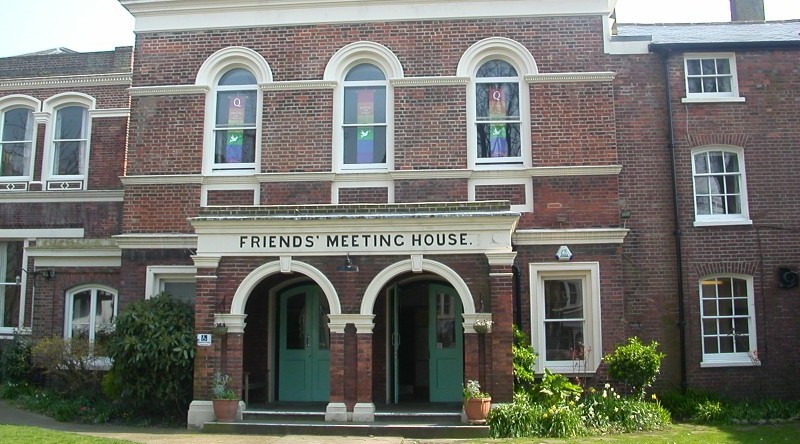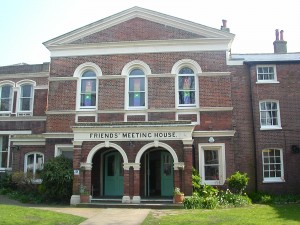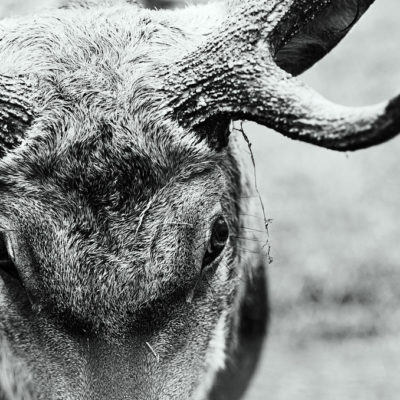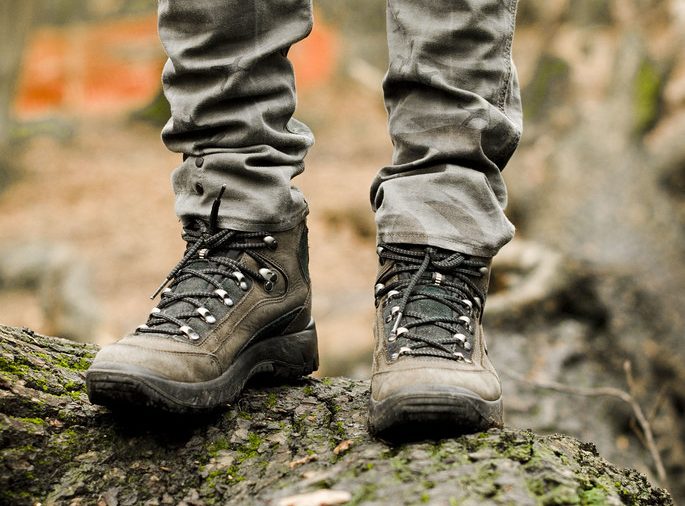

 Yesterday I spoke at the Brighton Interfaith AGM. It was held at the Quaker Friends Meeting House, a venue I played a concert at many year’s ago at Brighton’s sadly defunct World Sacred Music Festival. I’ve spoken at three of their interfaith meetings and they are always warm and welcoming, and what I really love is the understanding and openness shown by the organisers, speakers and attendees. I was on a panel alongside a Unitarian, a Muslim, and a Buddhist. Each of us spoke for around 10-15 minutes about our journey into our spiritual path, and how it has changed our lives.
Yesterday I spoke at the Brighton Interfaith AGM. It was held at the Quaker Friends Meeting House, a venue I played a concert at many year’s ago at Brighton’s sadly defunct World Sacred Music Festival. I’ve spoken at three of their interfaith meetings and they are always warm and welcoming, and what I really love is the understanding and openness shown by the organisers, speakers and attendees. I was on a panel alongside a Unitarian, a Muslim, and a Buddhist. Each of us spoke for around 10-15 minutes about our journey into our spiritual path, and how it has changed our lives.
Back in 1995 I spoke at my first interfaith meeting that covered the same topic. The first question from the audience came my way. It was an Evangelical Christian who asked, “All of those feelings you felt that attracted you to Paganism – how do you know it wasn’t Satan who placed them there?” It shows how far Paganism has come, that this time, just over 20 years later no such ridiculous questions were asked. This time the questions came from people in the audience who obviously had more knowledge and understanding of Paganism, but were also very intrigued by it.
Here is the text from my presentation:
I was asked to speak about faith and change. How I came to choose my Pagan path, and how it has affected my life.
My earliest memory of religion was going to Sunday school as a child. We were all in the loft of the local church, learning about Jesus and I guess it must have been approaching Palm Sunday as that word Palm is very strong in my memory. It must have made an impression because when I walked out of the church the air was freezing cold, and there was snow on the ground. Even at that tender age I knew that palm trees weren’t a common plant in Britain and in that instant the religion of Christ felt deeply distant to me. Like I was learning about the stories from a land thousands of miles away, and Christ and the desert heat of the Middle East, was beyond my reach. I looked at the countryside around me, the deep green forests, the hills of the Downs, and wondered even then what stories were being told of this land.
As I ventured into school I was taught all about the history of Britain. But once more there seemed as if there was a huge gap. According to my teachers our history began with the invasion of the Romans. Well that was 43AD, so what was happening here for the thousands of years before they arrived?
I am Cornish by birth and our family went back to Cornwall for our annual holiday every year after we moved away. There I saw the stone circles, Fogous, Long Barrows and settlements of the ancient peoples of this island. People who would never have even heard the name Christ. So what did they believe? That quest turned into an obsession and, the more I learnt and the more I looked that obsession turned into my spiritual path.
I discovered that much of what I had been taught by my teachers about those ancient people had been based on the words of classical writers like Caesar, Pliny, and others, many of whom were conquering warriors who needed to raise finance for their conquests. What better way to raise that finance than to paint the people they wanted to conquer as barbarians who would benefit from the civilisation of Rome.
It became very apparent to me that the ancient Pagans of this island were not barbarians at all, but people who traded with mainland Europe, created incredible structures that are still visible on the landscape, from Stonehenge to the hill forts of Cissbury, Chantonbury and Mount Caburn, here in Sussex. A tribal peoples who had an animistic view of the world. They didn’t appear to have a creator God, but rather had spirits within the landscape itself, the land that fed them and gave them water, the land that sustained their crops, and fed their cattle. The relationship between the Sun, and the land, the seasons, and the Moon and how it affected the tides. They also believed in an unseen Otherworld where the Gods and Heroes lived. This Otherworld has many names – Tir na Nog, The Land of the Ever Young, the Summerlands, Annwn or Annwfn, many of us will know it as the realm of Faerie. But no gossamer-winged little folk these, oh no, these are powerful magical ever-living being that are also the Genus Loci of ancient sacred sites. In Wales they are called Y Telwdd Teg, in Scotland they are Bogarts, in Cornwall they are Spriggans, here in Sussex they are called Pharises, which is simply a Sussex dialect corruption of the word ‘farieses’.
As I leaned about this Otherworld and the way it interacted with our own I also realised that this was a deeply magical world and, like prayer, magic was a valid and powerful way to interact with the gods. I know. Magic sounds either dangerous or deluded, and it’s neither, but maybe that’s the topic for another day.
If I was to sum up my Paganism in one sentence it would be ‘a spiritual path that enables a closer relationship to the natural world, both seen and unseen’. And that’s how it’s changed my life.
I was brought up believing that humans were somehow special. That we were made in the image of God and that we had dominion over the earth. Over my years within Paganism I’ve realised that this doesn’t make sense to me. I’ve realised that we are just another animal. Just another species on this miracle of a planet. That humanity is one of the most dangerous predators in the natural world, and the quicker we realise that we don’t have dominion, but instead share this planet, the better. Not just for us, but for every other species that walks the earth, soars in the sky, or swims in the oceans. My Paganism gives me a language that enables that closer relationship, and once you’ve began that conversation, that dialogue with Nature, there really is no going back.
There is a legend that says we should never eat the food of the Faerie. That if we did we would be lost to this world, and never be able to return. I now wonder if that actually means once your eyes have opened to the magic and majesty of a real relationship with those worlds seen and unseen, it changes everything, and you can never go back to how things were before.
In school I learned about the Greeks and Romans. I grew up knowing the names of Zeus, Apollo, Jupiter, Aphrodite. But as my Paganism grew I discovered the names of other Gods. I learned of Rhiannon, Ceridwen, Arawn, Manawydan, Bran, Branwen, Herne, Lleu Llaw Gyffes and Pryderi. I learned of the ancient woodland hunter Goddess of the Weald known as Andred. I learned that the land speaks with poetry and story, and these voices are the voices of the Old Gods themselves. They never went away. They have always been here, and their tales are still being told around Pagan campfires, under the same canopy of stars our ancestors sat beneath, speaking those same stories, honouring the Old Ways.
Blessed be.



This is so very very beautiful.
What a beautiful speech, and heartfelt. Thank you for sharing with all of us.
Your blogs are so inspiring. I look forward to every single one of them.
Thank you Dave, blessed be.
Wonderful, wonderful talk! Thank you for transcribing so that we may partake of it as well.
I enjoyed reading this Dave. I found it very heartening and supportive. I live in the rural, farming upper midwest of the USA, and unfortunately there are still plenty of people here who will accuse nonchristians of any flavour, of being in league with a being who seems very real and ever present to them, whom they call satan. But simply being seen as different from the community norm, can also reap this appellation, and the net can fall very wide since almost anyone they find different, or disagree with, or dislike in any way can be so labelled — I think for some such scape-goating can become a casual habit really. Worrisomely, some seem to consider that perceived differences in religion, gender identity, so-called race or ethnic origin, political polarity, etc, and even simple, enculturated misogyny, may justify violent actions — usually, but not always minor, often covert malicious acts such as yelling insults from a speeding car, or scraping through a bumper sticker down to the bare metal on a car’s finish while it is unattended in a parking lot or at night in the driveway, or throwing litter out a car window onto one’s property — (and they are prone to do the same to anyone they disagree with.) Obviously in a place where the average household is literally stuffed with guns of all descriptions, and the young men especially, but now-a-days even the girls, are brought up to believe that violence is a natural part of life, and is somehow a gloriously defining and essential part of one’s identity, it gives one pause before admitting to any nonconformist tendencies within the local rather homogeneous community at any rate, which can be a worry, and a strain. ‘Good to hear of more tolerant and edifying interactions.
I am so sorry for you Nancy, and for all people in the world who cannot open their heart and live true to their inner selves – in England we live in such a beautiful and ancient land, with the ancestor spirits so close under our feet – and we live in a tolerant society where difference is celebrated. We have pockets of behaviour as you describe, but they are very much frowned upon. I give thanks for being born here and feel blessed. Come and visit us.
I really love your words relating the eating the food of Faerie to once opening one’s eyes to the magic and majesty of the natural world, once can never go back. That really struck home for me, deep in my heart. Thank you for sharing this!
This is the way we were meant to live. Jehovah was nothing more then a local deity for the jews.
Thank You so much for always explaining it so simply, some of us are still learning this. I think the newer religions are so confusing, I understand that they were changing the rules to fit what they wanted to happen. I get so tired of being told, my beliefs are wrong, but theirs are not, it should come down to what works(gives strength) to each person. Blessed be!
Thank you very much for sharing! My way to the Pagan Way is similar! I recognised Christian Religion as imported, and my son and I were asking ourselves was what before? I live in the small town Bregenz in Autria, and Bregenz was founded by the celts and we began our Research. It was fantastic! Now the land, the celtic goddesses and gods are so real to us and our lives have changed in such a positive way!! Bregenz was named Briga by the celts, Brigantia was and is the goddess! I love her! And I love your Music! It is fantastic and I learned from your lyrics so much about the Pagan Ways. Thank you!
beautifully put 🙂
So beautifully said Dave ; )